By Howard Levitt
Tariffs, energy and workplace culture are all impacted
Tariffs
As detailed Wednesday, tariffs instituted by either country will result in fundamental employment dislocations. Entire sectors of our economy could be put at risk, depending on how significant eventual tariffs are. Canadians will be hurt financially, and their reduced spending will cause additional companies to close.
Oil
The promised opening up of U.S. oil and gas production and increased exports along with Trump’s promise to bring energy prices down will reduce revenue in our biggest industry, energy. Not only will we be competing against lower prices, but America will be importing less. This has the potential to hurt employment in our largest industry.
Green energy
Trump’s scrapping of Joe Biden‘s green new deal and his exit from the Paris Climate Accords will give Canadian companies little reason to decarbonize. To compete, we will need to scrap our carbon tax emissions limits, environmental controls and the billions our governments have plunged into electric vehicle manufacture, causing further employment upheavals.
Working from home
Federal employees in the U.S. will have to return to the office full-time. This could affect the requirements of their Canadian subsidiaries and create a further climate for employers to order their employees back to their workplaces.
Death of DEI
The president declared Diversity, Equity and Inclusion policies “dangerous, demeaning and immoral” and stated in an executive order that “illegal DEI policies not only violate the text and spirit of our longstanding federal civil-rights laws, they also undermine our national unity, as they deny, discredit, and undermine the traditional American values of hard work, excellence, and individual achievement in favour of an unlawful, corrosive and pernicious identity-based spoils system.”
U.S. federal diversity equity inclusion staff were immediately placed on paid leave, pending eventual layoffs and the government even instituted a snitch line, ordering workers to report it if a program was being renamed to avoid detection.
President Trump’s executive action also cut off federal funding to any learning institutions that mandate diversity, equity, and inclusion or hire contractors engaging in such practices.
Many Canadian companies have already reduced or eliminated their DEI programs in recent months. One can anticipate that subsidiaries of U.S. companies will quickly do so now to avoid potential sanctions. And if Canadian companies do not follow the U.S. example, employees here who feel disadvantaged by DEI will jump to the U.S. for opportunities of greater advancement.
The Canadian public appears to have turned against DEI: A recent poll found a majority of Canadians, including immigrants, oppose diversity quotas.
A radical recast of recruitment and promotion in Canadian companies is underway, with merit emerging as the only criterion.
Other changes
Numerous other decisions by President Trump could have an impact on the Canadian workplace.
One was to mandate that the U.S. recognizes only two sexes, male and female. When you find out that your friend, had a baby and ask what she had, there really are only two possible responses. Conservative leader Pierre Poilievre when questioned about that this week said “I only know of two genders,“ but added that people can call themselves whatever they want.
This obviously won’t have the direct type of workplace impact of other changes, but the collapse of wokeism in all its forms is well underway. We can expect to quickly see pronouns start to disappear from the bottom of emails and name tags, especially if a similar recognition is made in Canada.
Those who have been censoring others for politically incorrect speech and micro-aggressions are also likely to become much more quiescent given the backlash.
Mark Zuckerberg just announced Meta Paltforms Inc. will no longer police speech on Facebook and Instagram because fact-checking had “too often devolved into left-wing censorship.”
An article in the Wall Street Journal this week pronounced “the #Metoo slogan ‘believe women’ has become more akin to ‘hear women — and then verify’” declaring in the headline that it was cancel culture itself that is being cancelled.
All of these actions were preceded by public outrage over the three Ivy League University presidents, who were so scrupulous in guarding against micro-aggressions, having no apparent objection to open genocidal calls against Jews and, of course, the angry reaction to people using censorship and DEI to beat down opponents and take revenge.
People were simply sick of being told that they were not just “wrong“ but “bad.“

